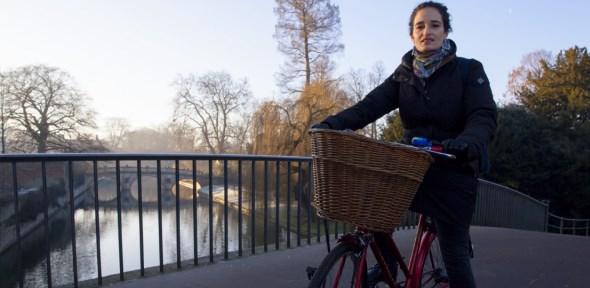
She loves the silence of libraries and believes that modesty is key to learning. Hagar Ben-Zion teaches Hebrew at the Language Centre and catalogues Hebrew books at the University Library. A plucky Jerusalemite, she learnt to ride a bicycle in Cambridge.
A language opens doors to history, literature, music, and more.
Hagar Ben-Zion
My love for languages comes from my mother and my love for Hebrew and books comes from my father. I grew up in Jerusalem where my parents met. These days I live in Cambridge and teach Hebrew at the University’s Language Centre — but I remain very much a Jerusalemite.
My students are wonderful. Each one has a different reason to learn Hebrew — to discover their own heritage, to get on in business, to study the modern side of biblical Hebrew, to be able to chat to good-looking Israeli guys in Tel-Aviv, or simply to have a new challenge. They are undergraduates, graduates, and members of staff. I teach all of them in the same group.
Some people have a talent for languages. It really helps if you’ve learnt more than one language while growing up. All teachers at the Language Centre speak three or four languages at least. The course I give is both language and culture. A language opens doors to history, literature, music, and more.
Modesty is important for language studying. Motivation drives you forward, hard work keeps you going, but modesty makes you think you’re not good enough, so you work even harder. Students with some background in Hebrew usually don’t realise they have a disadvantage rather than an advantage. Subconsciously they think they know things already and they work less hard.
When I was 20 I flew to Paris on my own. I didn’t speak a word of French and knew this was the only way to learn. Also, I wanted to be able to say I had lived in Paris. The first few months I was miserable. I was alone, I cried most days, and ate too many croissants. My parents wanted me to come home, but I was determined to stay. When I ran out of money, I got a job for the Israeli airline and stayed on.
People who really love books are not necessarily the ones who read them. I’m a bit obsessive about the materiality of books — I love typography, paper, bindings, dedications, graphic design of book covers, golden letters on books’ spines, and letters, letters, letters. The Hebrew alphabet is so much more than a bunch of graphemes.
I catalogue modern Hebrew books for the University Library. The UL is one of my favourite places in Cambridge. I like the silence and the atmosphere of people quietly reading or writing. I like the idea of working in a place with endless knowledge about so many things.
People think that Israelis are vulgar and brash. I tick both boxes but apparently I’m funny as well! A student once told me that every minute I don’t do stand-up comedy is a waste for humanity. He was probably exaggerating.
When I came to Cambridge I couldn’t ride a bicycle. I was 38. My husband made me learn and I think of it as one of my greatest achievements. For months I was covered in bruises. Now I cycle every day everywhere — and even enjoy it sometimes. Cycling across bridges over the Cam and seeing swans in the morning is something I will never stop appreciating.
However long I stay in the UK, I will remain a foreigner. I miss the Israeli sun and the warmth of Israeli people. We go back there every summer. My husband is a Lecturer in Hebrew & Aramaic at Cambridge. We speak Hebrew at home with our children who are totally bilingual. I want them to be happy in both cultures — it takes a lot of hard work and effort.
I love the international aspect of Cambridge. The first time I saw a nativity play was in my son’s nursery. My little Jewish-Israeli-Hebrew-speaking boy was singing a Christmas carol in Lebanese Arabic. After that, listening to my little girl sing “Twinkle twinkle little star” in Japanese wasn’t such a big deal.
This profile is part of our This Cambridge Life series.
